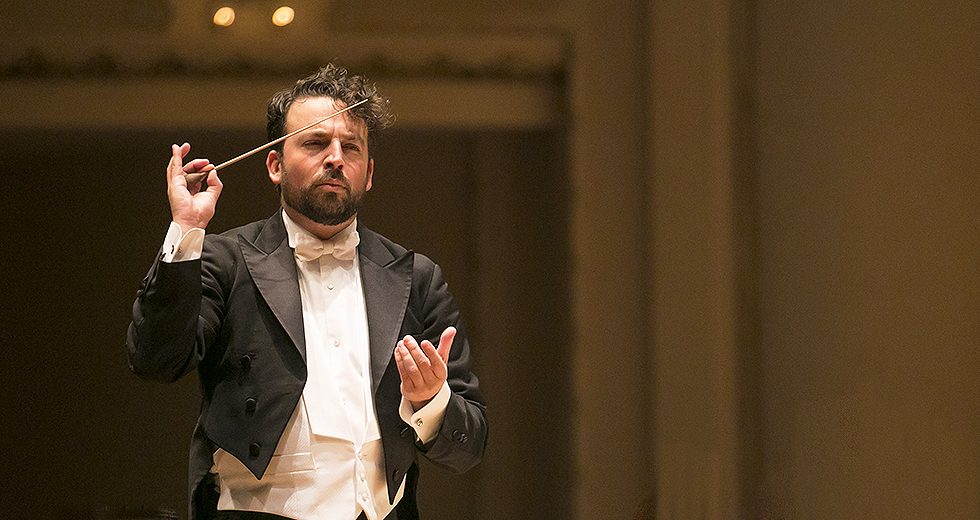
Most conductors aim to be generalists — as comfortable with Mozart’s 18th century classicism as with the spiky modernism of Stravinsky or Bartok.
Since his Chicago Symphony Orchestra debut in February 2009, the gifted American conductor James Gaffigan has treated CSO audiences to an especially unusual mix. His first set of CSO concerts, honoring the 200th birthday of Abraham Lincoln, included an orchestral arrangement of “Sweet Home Chicago” and Aaron Copland’s Lincoln Portrait before closing with Beethoven’s Symphony No. 5. In March 2009, he was back with a traditional program: two Beethoven pieces, the Fifth Symphony and the Piano Concerto No. 5. Last season, he conducted the world premiere of a concerto by Carl Vine, written for CSO trombonist Michael Mulcahy.
On Oct. 26-27, Gaffigan returns to Symphony Center with typically varied fare: works by two American composers — Leonard Bernstein and Samuel Barber — and a familiar orchestral showcase, Sergei Rachmaninov’s Symphonic Dances, Op. 45. Soloist James Ehnes will join Gaffigan and the orchestra for Barber’s Violin Concerto.
Bernstein is this season’s birthday boy, and orchestras all over the United States are celebrating his centennial. Gaffigan’s concerts open with the Symphonic Suite from On the Waterfront, drawn from Bernstein’s score for the 1954 Elia Kazan film. Unlike some American conductors building their careers, Gaffigan hasn’t been pigeonholed as an American music specialist. Now in his late 30s, he certainly has solid, made-in-America conducting credentials, including a degree from the Juilliard School and stints as assistant or associate conductor with the Cleveland and San Francisco Symphony orchestras. Since 2011, however, he has been chief conductor of Switzerland’s Lucerne Symphony Orchestra. (The Swiss orchestra made its U.S. debut this summer with Gaffigan leading two concerts at the Ravinia Festival.)
“Because I’ve been living in Europe for so long,” Gaffigan said, “and conducting a lot of European orchestras, I think [American orchestras] have given up asking me always to do American music. So it’s nice to return to America and do some Bernstein.”
A native New Yorker, Gaffigan grew up listening to the New York Philharmonic, and of course, hearing about the glories of Leonard Bernstein, the Philharmonic’s music director from 1958 to 1969. Gaffigan especially cherishes the way Bernstein talked about music, whether to concertgoers during a performance or in more structured settings like his popular Young People’s Concerts, televised on CBS from 1958 to 1972, and his six Harvard University Norton Lectures in 1973.
“I adore his music, and I think the man is almost as fascinating as his music, if not more so,” Gaffigan said. “This was an educator who brought education into our [concert] world, which was necessary. It’s not so much talking down to people. It’s more sharing the information because it’s not in Americans’ vernacular anymore. They don’t sit around playing chamber music in their living rooms. As cultural leaders, we have to share this information with people.”
Engaging and outgoing, Gaffigan is happy to offer some commentary at his concerts. “I do speak from the podium,” he said. “Even the places I thought it would not be a good idea, like Switzerland or Munich or Vienna, people are always appreciative, even if it’s only 30 seconds of an introduction. I think the future is about informing the public, not just through program notes but from the podium. I think there are bits and pieces of information that are worth hearing that aren’t in the program notes.”
He probably will provide comments before the On the Waterfront suite. “When there’s film music, and people haven’t taken time to read the program notes or they haven’t seen the film, it’s good that they know something about it,” he said. “Even if it only takes 45 seconds, it’s worth it to know what this music is about.”
And Gaffigan believes the struggles of Terry Malloy (played by Marlon Brando in the film) against societal pressure in “On the Waterfront” echo some of Bernstein’s own struggles.
“There’s a lot to do with Leonard Bernstein in that music,” he said. “Bernstein always struggled to be a serious composer, a serious opera composer. But he never did it in the public and the media’s eyes. He was always seen as the charismatic maestro and composer,” rather than a deeply insightful conductor like such venerated figures as Carlos Kleiber or Karl Böhm.
In the end, said Gaffigan, Bernstein managed to achieve that status in Europe. “He conducted all this incredible Schumann in Vienna,” he said. “Still the Vienna Philharmonic members tell me that some of the best musical memories of their lives was having Bernstein doing the Schumann symphonies or the Mahler symphonies. But that’s not what we’ll remember him for.”
Like Bernstein. Gaffigan knows how to keep an audience engaged. They have come for the music, he realizes, not to hear a lengthy speech from the conductor.
“It doesn’t have to take a long time,” Gaffigan said. “I’m not one of these people who likes to hear myself talk from the podium.”
Note: The CSO repeats the program Oct. 28 at the University of Illinois’ Krannert Center in Urbana-Champaign.
TOP: James Gaffigan conducts the CSO in the world premiere of Carl Vine’s Five Hallucinations in October 2016. | ©Todd Rosenberg Photography 2016
VIDEO: Conductor James Gaffigan, interviewed at the Ravinia Festival in August, discusses legacy of Leonard Bernstein and Sergei Rachmaninov.
VIDEO: